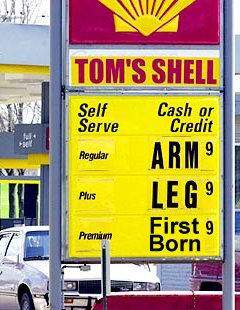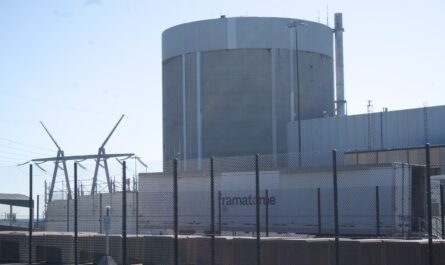This week the price of regular gasoline in my village at the top of Lake Michigan reached $2.60 a gallon, about 62 cents a gallon more than in January. Late last month, the Dow Jones experienced the steepest drop in years. Are the two connected? You bet.
You might also ask how these two trends are linked to the American Mode Shift, the transformation of metropolitan regions into cleaner, greener, more energy-efficient, more prosperous places?Â
Here’s how. Oil is and will remain the economic lifeblood of the planet. There is nothing remotely on the horizon that can replace it, despite what the President of the United States and the governor of our fair state say about alternatives. A few nations in the Middle East, led we’re told by Saudi Arabia, have most of the oil.Â
Well smart oil supply watchers, like the Oil Drum, have been reporting the strong likelihood that Saudi Arabia is flat out lying about how much oil it really has, and how much crude it is actually pumping. This sort of fact is important because the margins between oil supply, production, and demand are so tight that any chatter in the system produces wild price fluctuations that quickly become apparent at the pumps at Stapleton’s, the convenience store at the corner of US-31 and M-115, where I’ve purchased gas for over a decade now. Matthew R. Simmons, chairman of Simmons & Company International, a and a respected analyst, provided attendees at a London conference last month great background on the trends in production.   
Oil Drum reported that Saudi production fell 8 percent in 2006, a huge decrease for a nation that has boasted about its immense oil supply, and the technical ability to bring it to the surface. Though the news attracted no notice in America’s mainstream media, the money men and women on Wall Street, and the shrewd investors who move markets, pay attention to oil production because it is so important to stability. What explains Saudi Arabia’s sinking production in a year when oil markets were so strong and demand for petroleum was rising? The Saudis said they were trying to stabilize prices, but that would have meant increasing production to lower prices. Energy experts say they have a more likely explanation. Saudi Arabia has less recoverable oil than it claims.
As word of the production decline seeped out of the Middle East last month, stock prices plummeted in the Far East, then in Europe, and swept into U.S. markets. Stock analysts were invited onto NPR to issue calming rhetoric about a “market correction” and how investors shouldn’t panic. Maybe so, maybe not. But the underlying pressure in the economic system will continue to cause unexpected market eruptions for years, and they are likely to get worse. A couple of years ago the term “peak oil” crept into the American conversation to explain why gasoline prices had climbed to $3.20 a gallon after Hurricane Katrina, and why they’re likely to go higher this summer, and higher than that the next. Peak oil describes the economic knife edge where demand is outstripping production because there are just no more easily recoverable reserves left to produce. Exxon, for instance, is spending $20 billion to increase its production by 1 million barrels a day. In years past, that kind of investment would have yielded much higher returns.
And that leads me to the American Mode Shift. How do you protect yourself from the increasing entropy of a world that is running on increasingly scarce and expensive fuel? You live in a place that offers energy-efficient options in transportation, housing, accessibility, and development patterns. In other words, you try to reduce your vulnerabilities, and that means living where there are alternatives to the expensive, fuel-consuming, drive-through economy.Â
Fortunately, there are many more of those places in the United States than there used to be 20 years ago. The momentous civic movement that is producing better places in the United States is occurring in response to the shifts in market signals, including the economic and environment cost of crude oil. A great train construction race has begun in the West. (See earlier posts to Mode Shift) In the East, regional rapid transit systems are under modernization or expansion in Washington, New York, Philadelphia, Boston, and Atlanta.
New York, Salt Lake City, Portland, Seattle, and other cities are requiring public buildings, and many private ones to be constructed with the highest design standards of energy efficiency and environmental sustainability. New zoning and master planning is taking place in Dallas and Austin and Albuquerque to draw homes, schools, businesses, retail, and recreation closer together, saving fuel, time, and money. Green spaces and green roofs are under construction in Chicago and New York to reduce heat island effects and save energy for air conditioning and heating. The idea of these ideas and many others — building biking and walking paths, constructing schools close to neighborhoods, providing venture capital to energy efficiency entrepreneurs — is to provide residents with a competitive edge and a better place to live. The American Mode Shift in our cities is specifically intended to provide residents oil-reducing options that keep the quality of life high while energy reserves run low.

Keith:
Not sure I buy your “Peak Oil” thesis on current market situation.
1) “Peak Oil” still debatable and I sincerely doubt that there will ever be a time when they “ring the bell†that we’ve reached the point. Recognition will happen in hindsight, likely years later. The oil market is so large and varied that the data is likely to be very complex.
2) Simmons argument is interesting but keep in mind that he’s a financial analyst, not a geologist and does have an agenda … to sell his services.
3) I’d lay the current market volatility to several other factors, such as the Bank of Japan (BoJ) move on interest rates last month and the resulting effects on the “yen carry tradeâ€, the moves by China to “modernize†it’s banking and dampening speculation in the Shangai Market. Rumbling in the sub-prime mortgage market has had an effect as well.
I’m on board with other points you make, more efficient urban environments etc.
I’ll toss out a couple of reads:
1) as a skeptic of hybrids, but following automotive (personal transportation) trends there is an interesting piece on advancements in battery technology here:
http://www.nytimes.com/2007/03/11/business/yourmoney/11stream.html?_r=1&ref=business&oref=slogin
2) Not (yet) online, current issue (pulp version) of Fortune on “The End of Garbageâ€, heavy duty recycling.
I’ll try to blog on these later
Keep up the good work(s)
Chip,
This is useful knowledge and I appreciate your engagement, especially on the peak oil thesis. From what I read, and judging some of the authorship on the subject including Amory Lovins and the Rocky Mountain Institute, I suspect that the peak oil thesis has credibility. At the very least, isn’t the crediblity of the thesis reflected in the volatility in energy prices we’ve been experiencing? Keith
Keith
We’ll keep this “discussion” in the comments, see if it triggers others.
I’ve followed the oil market for years, and have a “hobby” interest in geology (one of the few courses I really enjoyed in college. Far back enough that Plate Tectonics was “Contential Drift” and still fringe stuff (G)
Back on topic – I’d have to check data on volatility (http://en.wikipedia.org/wiki/Volatility) in the oil markets. Financial markets, in general have had lower volatility the last couple of years, one reason the last few weeks action has gotten attention.
Personal opinion: the markets have $5-10 “risk premium build into them, mainly “geo-political” risk.
I’ve read a lot on both sides, and am a skeptic on “peak oil”, but open-minded.
For interesting reading, and material that is considered very “far out” by the oil industry, check this out
http://en.wikipedia.org/wiki/Thomas_Gold
I was attracted to Tom’s work years ago when he asked a simple question: “Why are hydrocarbons on earthy “fossil” when we also find them on other planets”
What happens if hydrocarbons are really primordial, not fossil ???
More here: http://www.longbets.org/257 where I reference Danny Hillis
http://www.longbets.org/168
Now, coupled with my skepticism, I applaud Corporate moves to be more “green”, bright managers know that there is money to be made with efficiency and “doing good”
Sorry that the Fortune piece on recycling isn’t online (therefor link-able) but it patterns to Buckey Fuller: “there is no such thing as pollution, it’s just mis-allocation of resources”. The piece referenced Wal-Mart as commenting on packaging “we pay once to buy it, then again to dispose of it” better to recycle.
Let’s “continue the conversation”
Ciao
Chip